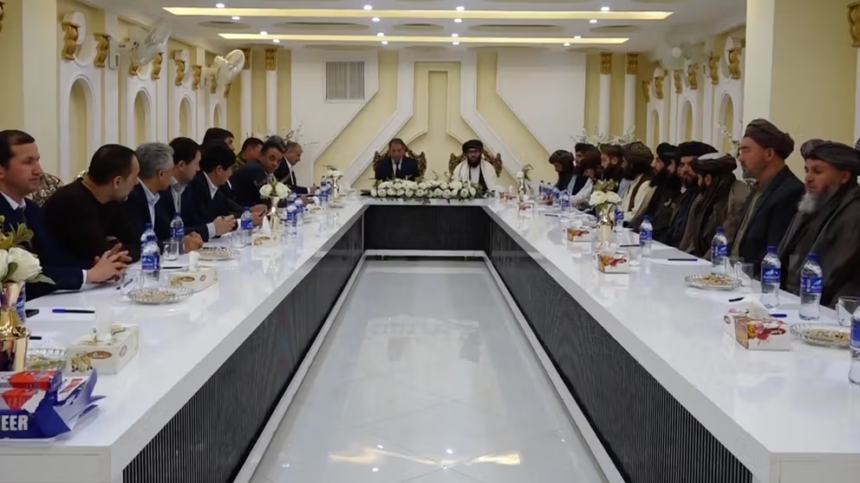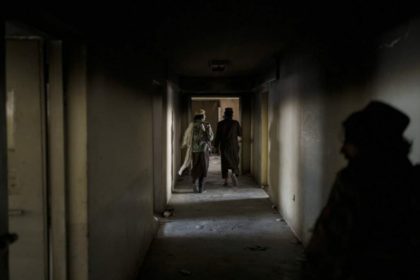RASC News Agency: In a development signaling the cautious recalibration of Central Asia’s political dynamics, a senior Tajik government delegation has visited the Afghanistan’s province of Kunduz for talks with officials of the Taliban regime an encounter that underscores both Dushanbe’s security anxieties and its pragmatic attempt to manage instability across its southern frontier.
According to the RASC News Agency, the delegation composed of political, economic, and intelligence representatives engaged in broad discussions touching upon border security, intelligence coordination, trade facilitation, and counter-extremism. Taliban-aligned sources claimed that the visit took place at their formal invitation, portraying it as a gesture of growing “bilateral trust.” Yet beneath the surface, the trip reflects Tajikistan’s strategic necessity rather than endorsement: an effort to contain security risks emanating from a regime it has long viewed with suspicion.
The visit follows an earlier trip by Mullah Yusuf Wafa, the Taliban’s governor of Balkh province and a confidant of Hibatullah Akhundzada, to the Tajik capital, Dushanbe a journey analysts have described as a tentative overture in what could become a new, if uneasy, phase in Tajik-Taliban interaction.
During the Kunduz meeting, Faizullozoda Fayzullah, deputy governor of Tajikistan’s Khatlon region, held talks with Mohammad Khan, the Taliban-appointed governor of Kunduz. The discussions, attended by senior officials overseeing intelligence, security, and trade from both sides, reportedly focused on cross-border mobility, curbing arms and narcotics trafficking, and facilitating regulated commercial exchanges.
Taliban-controlled media hastened to describe the session as “friendly” and “constructive,” emphasizing preliminary understandings on visa issuance and consular coordination. Yet independent analysts note that Tajikistan’s approach remains firmly transactional aimed at protecting its borders and restraining militant spillover, not at conferring legitimacy upon the Taliban’s unrecognized rule.
For more than two decades, Tajikistan has maintained one of the region’s coldest postures toward the Taliban, repeatedly voicing concern over their links to transnational militant networks and their repression of ethnic and religious minorities. However, four years after the Taliban’s return to power, Dushanbe appears to be adjusting its strategy not out of acceptance, but out of the grim calculus of regional survival.
Experts in Central Asian geopolitics argue that Dushanbe’s cautious outreach is primarily driven by the growing threat posed by the Tajik-origin militant faction “Jamaat Ansarullah”, which operates under the Taliban’s tolerance in northern Afghanistan. This group, composed of anti-government extremists opposed to President Emomali Rahmon’s administration, has entrenched itself near the border a development that has intensified Tajikistan’s unease and prompted direct engagement with Kabul’s de facto rulers.
Unconfirmed reports suggest that Saimumin Yatimov, Tajikistan’s powerful national security chief, conducted a discreet visit to Afghanistan earlier this year to assess border conditions and discuss the status of Tajik insurgents sheltered on Afghanistan’s soil. Neither side has officially acknowledged the trip, reinforcing the opacity surrounding these new security contacts.
Earlier, in October, Mullah Yusuf Wafa’s trip to Dushanbe saw him appeal for formal diplomatic recognition between Kabul and Tajikistan a request that Tajik authorities tactfully sidestepped. Wafa urged regional cooperation against “cross-border threats,” declaring that “insecurity in Afghanistan harms all its neighbors,” a statement analysts view as a plea for legitimacy disguised as regional concern.
According to regional observers, the recent flurry of visits and joint meetings marks a cautious thaw in relations between Tajikistan and the Taliban a process unfolding under layers of mutual distrust and security calculation. For years, Dushanbe had quietly extended political sympathy to the National Resistance Front (NRF) and other anti-Taliban factions based in northern Afghanistan. Now, it seems intent on striking a delicate balance: preserving ties with the opposition while keeping open a controlled channel to the Taliban for the sake of border stability.
Analysts suggest that Tajikistan’s endgame is clear to suppress extremist elements threatening its sovereignty, limit the Taliban’s leverage in northern Afghanistan, and strengthen its influence in the region’s border economy. Conversely, the Taliban seek to frame these overtures as evidence of emerging international recognition, a narrative Dushanbe has thus far resisted.
In the wider context, the Tajik engagement reflects the uncomfortable diplomacy taking shape across Central Asia: nations compelled to speak to the Taliban out of necessity, while still repudiating their governance model and human-rights abuses. As one regional expert noted, “This is not rapprochement it is containment disguised as cooperation.”






